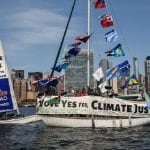
Greenpeace action on the East River on September 17, 2022 in New York City. Photographer: Stephanie Keith
Written by Julia Day
Climate change and its implications is one of the key issues facing the world at the moment. The impacts of climate change are especially poignant when living in the South Pacific. Professor Hussein, who is also an Adjunct Professor at UNE notes: ‘The impacts of climate change are clear to see all the time in the South Pacific. We recently had two cyclones here in Vanuatu, which created significant issues for the residents. These natural disasters cause major problems with food supply and access to fresh water and adequate sanitation for residents. Some people lost their houses, and many people still don’t have access to electricity or internet services. Some of our students had to discontinue their legal studies as they had to move to other parts of the country.’
 In 2019 a group of students based at the University of South Pacific in Vanuatu, decided it was time for their voices to be heard and action to happen. Dr Justin Rose, who was previously a Research Fellow with UNE Law, was instrumental to starting this action. Dr Rose challenged a group of his students, who were studying Environmental Law, to ‘discuss the most ambitious and productive action Pacific Island countries could initiate within international law to address climate change, and then to prepare letters and a brief that could be sent to Pacific Island Forum leaders persuading them to implement it.’ This initiative led to the group of passionate students creating a movement demanding action by world leaders in this space. This group was supported by a number of professional bodies and the Vanuatu government. The activists eventually took their plight to the United Nations.
In 2019 a group of students based at the University of South Pacific in Vanuatu, decided it was time for their voices to be heard and action to happen. Dr Justin Rose, who was previously a Research Fellow with UNE Law, was instrumental to starting this action. Dr Rose challenged a group of his students, who were studying Environmental Law, to ‘discuss the most ambitious and productive action Pacific Island countries could initiate within international law to address climate change, and then to prepare letters and a brief that could be sent to Pacific Island Forum leaders persuading them to implement it.’ This initiative led to the group of passionate students creating a movement demanding action by world leaders in this space. This group was supported by a number of professional bodies and the Vanuatu government. The activists eventually took their plight to the United Nations. 
This initiative has led to the UN General Assembly adopting by consensus a resolution requesting the International Court of Justice to provide an opinion in respect of climate change. This is significant as it strengthens ‘the role of human rights law in responses to climate change under international law.’
This work has been gaining attention around the world, and very recently Crown Princess Mary of Denmark visited the University of South Pacific in Vanuatu to learn more about the activism. Dr Rose gave an impressive speech for Her Majesty, where he noted:
 ‘Educating young Pacific Islanders about climate change, and international climate change law, is an honour – but can also be personally challenging. Scientific facts that must be taught present an increasingly grim picture of Pacific Island futures, and the response of the international community, in law and in action, is entirely inadequate…I remain in awe of the achievements of Pacific Islands Students Fighting Climate Change and the civil society movement they formed and led in support of this remarkable and globally significant initiative.’
‘Educating young Pacific Islanders about climate change, and international climate change law, is an honour – but can also be personally challenging. Scientific facts that must be taught present an increasingly grim picture of Pacific Island futures, and the response of the international community, in law and in action, is entirely inadequate…I remain in awe of the achievements of Pacific Islands Students Fighting Climate Change and the civil society movement they formed and led in support of this remarkable and globally significant initiative.’
Thank you, Justin, and Daud for sharing this inspirational story of student passion and activism relating to climate change!



